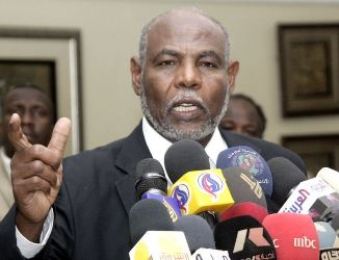Bashir’s visit to Juba will go ahead despite rejection of AU proposal on Abyei
November 17, 2012 (JUBA) – The visit of Sudan’s President Omer Al-Bashir to South Sudan will go ahead despite his recent comments rejecting an African Union Peace Security Council proposal over the final status of the Abyei region, Khartoum’s Ambassador to Juba, Mutrif Sadiq, said Friday.

Relations between Juba and Khartoum have been tense since South Sudan seceded in July 2011. The two nations came close to all out war in April 2012 following the seizure of Heglig/Panthou by the South Sudanese army.
However, in September they signed Cooperation Agreement covering many issues including oil transport fees, border security and providing citizens of both countries the freedom of residence, freedom of movement, freedom to undertake economic activity and freedom to acquire and dispose property.
Ambassador Sadiq, after a meeting with South Sudan’s foreign minister Nhial Deng Nhial, on Friday said that Bashir’s visit would improve relations between the countries in many ways.
He vowed Sudan’s commitment and willingness to establish strong bilateral ties with South Sudan, through the implementation of the September Cooperation Agreement, which called on both sides to establish a demilitarised border zone.
The ratification of the agreement by the parliaments of both country’s “shows commitment of the leadership in the two countries to resolve differences. It also means there is a strong common support from both parties”; Sadiq said.
Sadiq said that the two countries have “have common history” and ” have a common destiny” adding they also have numerous mutual interests but became different entities due to divergence in political ideologies and choice of the people.
“We must work to strengthen our relations and reduce potential disputes. We must try to work together as brothers and sisters so that we avoid going back to war and hatred,” he said.
Ambassador Sadiq, who was a member of Khartoum’s negotiating team in the Addis Ababa talks between Sudan and South Sudan, said that he has spent much of his time working to narrow the gaps between the two nations and “to bring the relationship back on track to avoid returning to war”.
“Sudan is ready to support building strong relations with our brothers and sisters in the state of South Sudan. We have shown this commitment and our greatest achievement was the signing of Comprehensive Peace Agreement (CPA). Our acceptance to conduct referendum. And, do not forget that Sudan was the first country to recognise the state of South Sudan,” he stressed.
Bashir’s visit to Juba was expected to take place following the operationalisation of the demilitarised zone and the deployment of joint patrols on the common border.
But during the recent round of talks of the joint security committee chaired by the defence ministers in Juba, the two sides failed to agree over the deployment of troops on the common border of Blue Nile and South Kordofan where Khartoum is fighting Sudanese rebels.
Also, tensions have been rising in the Abyei region following Sudan’s rejection of a decision of AU Peace and Security Council to hold a referendum without the Misseriya nomads next year if the two sides to reach a compromise in the next six weeks.
(ST)
